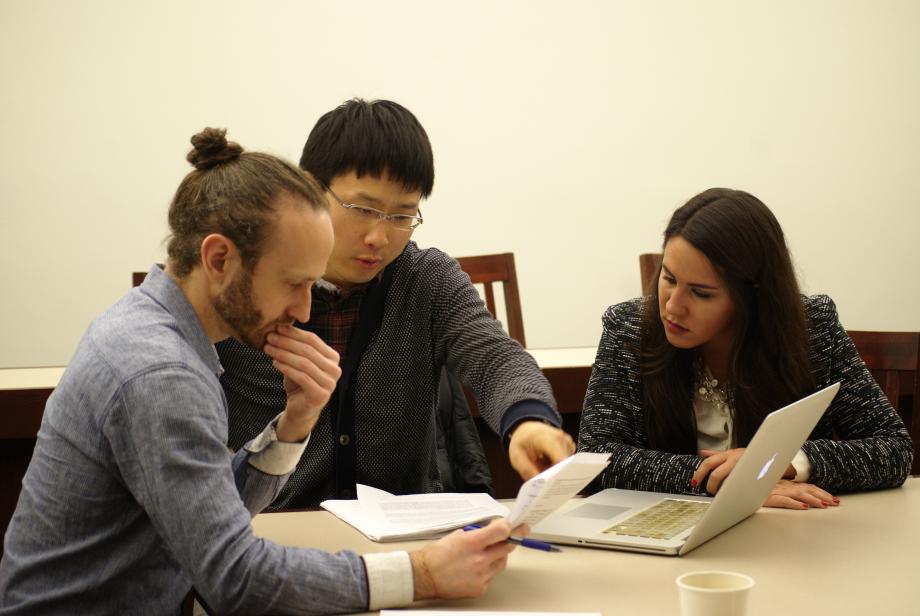Clinic Students Reveal Crime Data Discrepancy

Student members of the Law School’s International Human Rights Clinic presented original research at a national summit last month that revealed troubling discrepancies in hate crime reporting. The presentation was part of a clinic project that could eventually give the students a chance to help implement important reforms.
Law School student Changho Kim, ‘15, and Social Service Administration graduate student Katherine Youssouf, ‘15, told prosecutors, law enforcement officials, service providers, educators, and researchers attending the Hate Crime Summit sponsored by the Chicago Commission on Human Relations that the FBI isn’t reporting all of the hate crime data collected by the Illinois State Police because the two agencies categorize certain hate offenses differently. The research is part of a clinic project that began last spring and is overseen by Clinical Lecturer Brian Citro, who is the Acting Associate Director of the IHR Clinic, and Lecturer Cynthia Shawamreh, who co-chairs the Illinois Subcommittee on Hate Crimes and Discrimination Against Religious Institutions.
“The findings are important because policymakers allocate resources and budget based on this data,” Kim said. “Some of the prosecutors and law enforcement officers were not aware of the discrepancy issues, so it was beneficial for them.”
Citro agreed, saying that good data is an essential part of policymaking.
“Understanding what kinds of hate crimes are happening and where they are occurring is critical to developing a finely tuned response,” he said.
The students’ research, including some conducted last year by then-undergraduate student Mrinalini Penumaka, showed that differences in how state and federal agencies categorize certain hate offenses means the FBI isn’t collecting and reporting all of the hate crime data collected by the Illinois State Police. For instance, in its hate crime statistics, the FBI tracks rape, but the Illinois State Police uses a broader category that tracks all sexual assault. As a result, a portion of the bias-driven sex crimes don’t make it into the federal tally. Illinois also collects data on four offenses that the FBI doesn’t report: mob action, criminal trespass, disorderly conduct, and harassment. In addition, until this year, the two agencies didn’t coordinate their reporting deadlines, Citro said.
“It’s a significant problem if data is being lost, especially at the federal level,” Youssouf said.
What’s more, hate crimes tend to be underreported and insufficiently recognized by local agencies, IHR Clinic members said.
Hate crimes are those motivated by a bias, such as race, gender, religion, sexual orientation, or disability. Illinois has experienced a variety of hate crimes and discrimination against religious institutions in recent years and months. For example, in February, several houses of worship in Gurnee and Waukegan were sprayed with anti-religious graffiti. In October, a 26-year-old man stabbed an elderly African-American woman in a grocery store because she was black and an “easy target.” He has been charged with attempted first-degree murder and a hate crime.
The Subcommittee, a part of the Illinois State Advisory Committee to the U.S. Commission on Civil Rights, was tasked with helping determine if the levels of protection against hate crimes in Illinois are adequate and, if not, to identify possible policy changes. The IHR Clinic, which Kim worked in last academic year and Youssouf joined this fall, has assisted the subcommittee by conducting legal and policy research examining applicable federal, state, and local laws, and through empirical analysis of Illinois hate crime data.
In August, Citro testified at a public hearing before the Illinois State Advisory Committee, reporting the students’ findings on data discrepancies. Subsequently, the subcommittee was selected to report its preliminary findings and working recommendations at the summit, which was held at the University of Illinois at Chicago. Public officials and law enforcement officers from the Cook County State’s Attorney’s Office and the Chicago Police Department, as well as other law enforcement and government officials, community activists and scholars, attended the presentation and provided key insights into the enforcement and prosecution of hate crimes in Illinois.
Since the summit, Kim and Youssouf have continued to assist the Subcommittee with the research and preparation of a draft report to be submitted by the state advisory committee to the U.S. Commission on Civil Rights. Along with documenting the deficiencies and discrepancies, the report will examine what obligations the United States has under international human rights law to help prevent and prosecute hate crimes. In particular, it will discuss the International Covenant on Civil and Political Rights and the International Convention on the Elimination of Racial Discrimination, both of which have been ratified by the United States. If the report is approved in Washington, the IHR Clinic may have the opportunity to help implement some of the report’s recommendations.
The project has given the students a chance to make an impact on an important issue.
“It’s a unique opportunity for the students to engage with both state and federal policymakers and law enforcement agencies, to have a chance to speak publicly on research — and to experience what it’s like to make an impact and to contribute to policymaking,” Citro said. “It’s great experience."